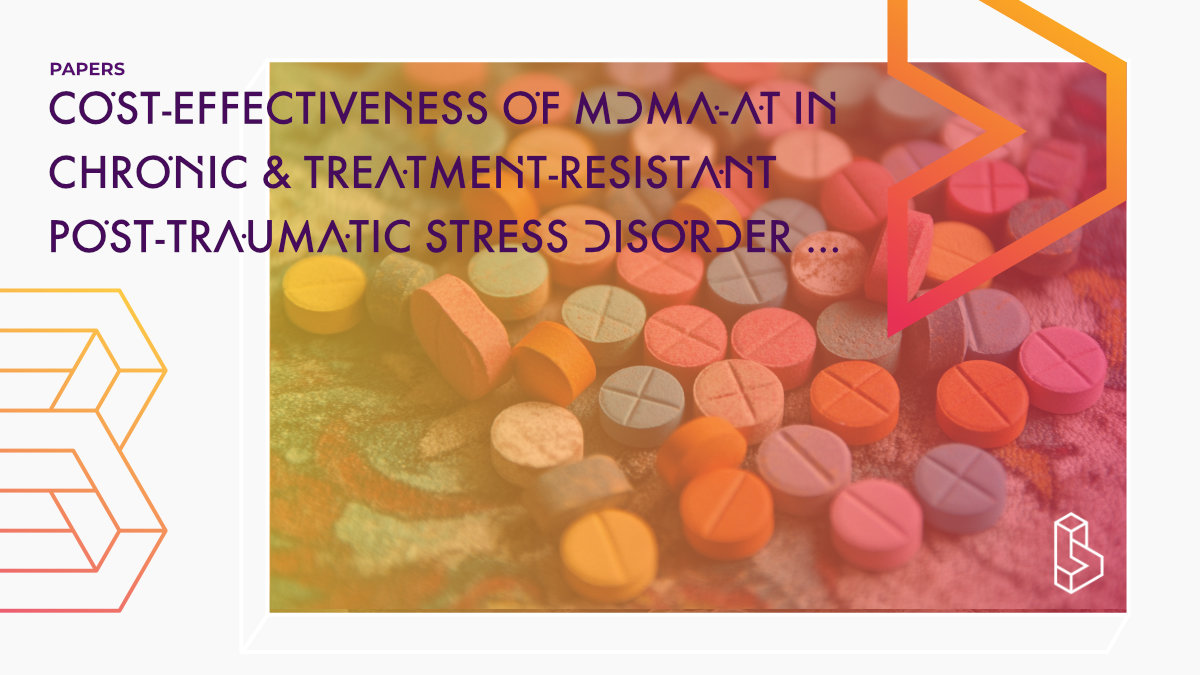This cost-effectiveness analysis compares MDMA-assisted therapy (MDMA-AT) versus placebo with therapy (PT) for chronic PTSD treatment over 5 years. Using a health state-transition model, it finds MDMA-AT to be cost-effective with an ICER of $83,845 per QALY (below the $150,000 willingness-to-pay threshold), despite higher intervention costs ($48,376 vs $12,376), due to reduced healthcare visits and better health outcomes (0.377 QALY increment).
Abstract of Cost-effectiveness of midomafetamine-assisted therapy (MDMA-AT) in chronic and treatment-resistant post-traumatic stress disorder of moderate or higher severity
“Objective To explore the cost-effectiveness of midomafetamine-assisted therapy (MDMA-AT) compared to placebo with therapy (PT) in US healthcare settings.
Methods A health state-transition model was used to analyze the cost-effectiveness of MDMA-AT for treating patients with chronic PTSD of moderate or higher severity. Both treatment arms consisted of 3 preparation (90-min), 3 interventional (8-h), and 9 integration (90-min) sessions, lasting ~4 months total. All sessions included psychotherapy, with interventional also including MDMA or placebo. After receiving treatment, patients were distributed across health states of No PTSD (not meeting PTSD diagnostic criteria), Non-Severe PTSD (treatment responders), Severe PTSD (treatment non-responders), and death. Each state had unique healthcare costs and utilities sourced from real-world data analysis and patient data from MDMA-AT clinical trials (including long-term follow-up). The base-case analysis considered the payer’s perspective with a 5-year horizon, 3.5% annual cost and effect discounts, and an assumed MDMA medication price of $12,000 per session. Trial-derived utilities and US life tables mortality data were used to calculate quality-adjusted life years (QALY). The main outcome was an incremental cost-effectiveness ratio (ICER) with a $150,000 willingness-to-pay (WTP) threshold.
Results The base-case ICER was $83,845 per QALY. Total direct costs were $64,745 in the MDMA-AT and $33,132 in the PT arms ($31,613 increment). The costs of intervention were $48,376 for MDMA-AT and $12,376 for PT. The highest MDMA medication cost to fit under the WTP threshold was $20,314 per session. Costs related to PTSD healthcare visits and other PTSD treatments were lower with MDMA-AT than PT (-$2,511 and -$1,877 increments, respectively). Utility benefits were higher in MDMA-AT than PT, with 3.691 and 3.314 QALYs generated over 5 years, respectively (0.377 QALY increment).
Conclusion These data suggest MDMA-AT may be a cost-effective treatment compared to PT for patients with chronic PTSD of moderate or higher severity.”
Authors: Filip Stanicic, Vladimir Zah, Dimitrije Grbic & Debra De Angelo
Summary of Cost-effectiveness of midomafetamine-assisted therapy (MDMA-AT) in chronic and treatment-resistant post-traumatic stress disorder of moderate or higher severity
Post-traumatic stress disorder (PTSD) represents a significant psychiatric condition affecting up to 9.1% of US civilians and 50.2% of military personnel annually. The condition develops following exposure to traumatic events, particularly related to war, sexual abuse, or natural disasters. Certain populations show increased vulnerability to PTSD, including females, those with childhood trauma, individuals with pre-existing mental health conditions, and those with limited socioeconomic resources or social support. The economic impact is substantial, with US individuals with PTSD incurring approximately $19,600 more in healthcare costs annually compared to those without PTSD in 2018.
Current treatment approaches combine psychotherapy and pharmacological interventions, with psychotherapy helping patients process trauma while medications aim to reduce symptom severity. However, existing treatments face significant challenges. Pharmacotherapy typically requires long-term use to maintain benefits, often leading to adverse effects and treatment discontinuation. Additionally, both first-line psychotherapies and medications show high failure rates in clinical trials.
MDMA-assisted therapy (MDMA-AT) represents a novel investigational approach being developed by Lykos Therapeutics. The treatment combines MDMA administration with manualized psychotherapy, hypothesised to work by affecting serotonergic activity in the left amygdala. This mechanism may help process trauma by reducing fear responses, decreasing stress reactions, and eliminating chronic hyperarousal while maintaining access to emotional processing. Phase III trials have shown promising results for MDMA-AT compared to placebo with therapy in treating moderate to severe PTSD, with typically mild and manageable adverse effects.
Methodology
Model Design
Find this paper
https://doi.org/10.1371/journal.pone.0313569
Open Access | Google Scholar | Backup | 🕊
Cite this paper (APA)
Linked Research Papers
Notable research papers that build on or are influenced by this paper
MDMA-assisted therapy for moderate to severe PTSD: a randomized, placebo-controlled phase 3 trialThis multi-site, randomized, double-blind, Phase IIIb trial (n=104) evaluated the efficacy and safety of MDMA-assisted therapy (MDMA-AT) for individuals with moderate to severe PTSD. The study found significant reductions in PTSD severity (CAPS-5 score) and functional impairment (SDS score) for the MDMA-AT group compared to placebo with therapy. Seven participants experienced severe treatment-emergent adverse events, but no deaths or serious adverse events were reported. The treatment was found to be generally well tolerated in a diverse population.
MDMA-assisted therapy for severe PTSD: a randomized, double-blind, placebo-controlled phase 3 study
This double-blind, placebo-controlled study (n=90) finds that MDMA-assisted therapy (3x 80-120mg) is effective (d=.91, large effect size) in the treatment of PTSD. 67% of those in the MDMA-group no longer qualified for PTSD (vs 32% for the therapy-only group). This study is part of the Phase III trial to get MDMA approved by the FDA.
Updated cost-effectiveness of MDMA-assisted therapy for the treatment of posttraumatic stress disorder in the United States: Findings from a phase 3 trial
This study (2022) builds on previous research assessing the cost-effectiveness of MDMA-assisted therapy (MDMA-AT) for the treatment of PTSD by assessing the data from a recent phase III trial. MDMA-AT as conducted in the phase III trial costs $11,537 per patient. Compared to the standard of care for 1,000 patients, MDMA-AT generates discounted net health care savings of $132.9 million over 30 years. Ultimately, MDMA-AT for severe or chronic PTSD is cost-saving while delivering substantial clinical benefit.

